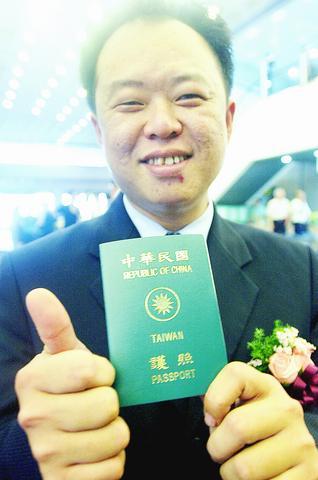New passports with the word "Taiwan" in Roman script on the cover were formally issued yesterday.
To mark the occasion, Minister of Foreign Affairs Eugene Chien (
Kuo Yi-ming (

PHOTO: SEAN CHAO, TAIPEI TIMES
"I think I'd like to visit China first," he said when asked where he would like to go with his new passport.
Unfortunately for Kuo, his new passport will be of little use to him on this trip as Taiwanese visiting China need a "Taiwan compatriot" travel document.
Yang Sheng-chung (楊勝宗), director of the Ministry of Foreign Affairs' Bureau of Consular Affairs, said that old passports will remain valid until their expiry dates. Old versions of the passport had only the nation's official name, Republic of China, on the cover.
The government's move to add the word "Taiwan" to the cover has upset China, which views it as an affront to the "one China" principle.
Chien defended the change as being apolitical. He said that Taiwanese traveling abroad were often confused with citizens of China and that now it would be clear where they were from.
The foreign minister also said that many countries had expressed a willingness to cooperate with Taiwan over the new passports after a publicity campaign through embassies, consulates and representative offices.
"We have not heard of any dissenting opinions concerning this new version of the passport so far; because after all, it is a pure travel document for ROC nationals," Chien said.
Presidential Office Secretary-General Chiou I-jen (
Meanwhile, members of the Alliance to Campaign for Rectifying the Name of Taiwan, in an attempt to further their cause of changing the nation's name to Taiwan, yesterday handed out passport jackets with "Republic of Taiwan" printed on them to travelers at CKS International Airport.
Also See Story:
DPP holds contest on passport

ENDEAVOR MANTA: The ship is programmed to automatically return to its designated home port and would self-destruct if seized by another party The Endeavor Manta, Taiwan’s first military-specification uncrewed surface vehicle (USV) tailor-made to operate in the Taiwan Strait in a bid to bolster the nation’s asymmetric combat capabilities made its first appearance at Kaohsiung’s Singda Harbor yesterday. Taking inspiration from Ukraine’s navy, which is using USVs to force Russia’s Black Sea fleet to take shelter within its own ports, CSBC Taiwan (台灣國際造船) established a research and development unit on USVs last year, CSBC chairman Huang Cheng-hung (黃正弘) said. With the exception of the satellite guidance system and the outboard motors — which were purchased from foreign companies that were not affiliated with Chinese-funded

PERMIT REVOKED: The influencer at a news conference said the National Immigration Agency was infringing on human rights and persecuting Chinese spouses Chinese influencer “Yaya in Taiwan” (亞亞在台灣) yesterday evening voluntarily left Taiwan, despite saying yesterday morning that she had “no intention” of leaving after her residence permit was revoked over her comments on Taiwan being “unified” with China by military force. The Ministry of the Interior yesterday had said that it could forcibly deport the influencer at midnight, but was considering taking a more flexible approach and beginning procedures this morning. The influencer, whose given name is Liu Zhenya (劉振亞), departed on a 8:45pm flight from Taipei International Airport (Songshan airport) to Fuzhou, China. Liu held a news conference at the airport at 7pm,

AIR SUPPORT: The Ministry of National Defense thanked the US for the delivery, adding that it was an indicator of the White House’s commitment to the Taiwan Relations Act Deputy Minister of National Defense Po Horng-huei (柏鴻輝) and Representative to the US Alexander Yui on Friday attended a delivery ceremony for the first of Taiwan’s long-awaited 66 F-16C/D Block 70 jets at a Lockheed Martin Corp factory in Greenville, South Carolina. “We are so proud to be the global home of the F-16 and to support Taiwan’s air defense capabilities,” US Representative William Timmons wrote on X, alongside a photograph of Taiwanese and US officials at the event. The F-16C/D Block 70 jets Taiwan ordered have the same capabilities as aircraft that had been upgraded to F-16Vs. The batch of Lockheed Martin

GRIDLOCK: The National Fire Agency’s Special Search and Rescue team is on standby to travel to the countries to help out with the rescue effort A powerful earthquake rocked Myanmar and neighboring Thailand yesterday, killing at least three people in Bangkok and burying dozens when a high-rise building under construction collapsed. Footage shared on social media from Myanmar’s second-largest city showed widespread destruction, raising fears that many were trapped under the rubble or killed. The magnitude 7.7 earthquake, with an epicenter near Mandalay in Myanmar, struck at midday and was followed by a strong magnitude 6.4 aftershock. The extent of death, injury and destruction — especially in Myanmar, which is embroiled in a civil war and where information is tightly controlled at the best of times —